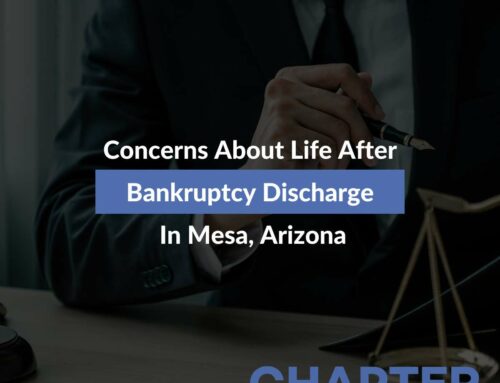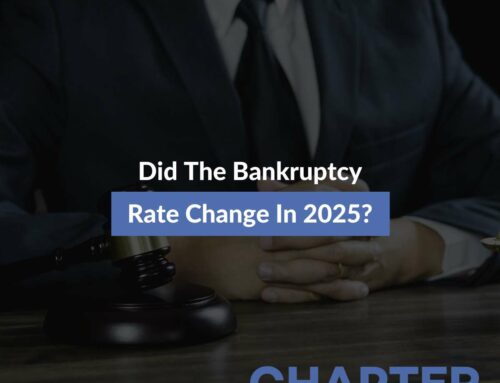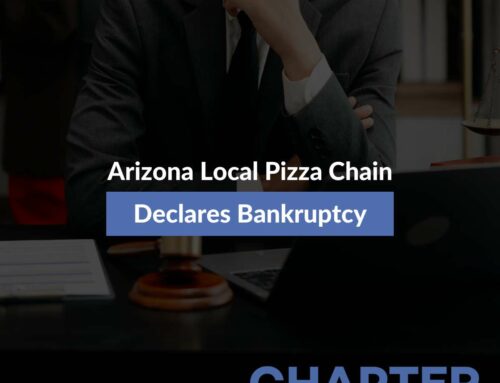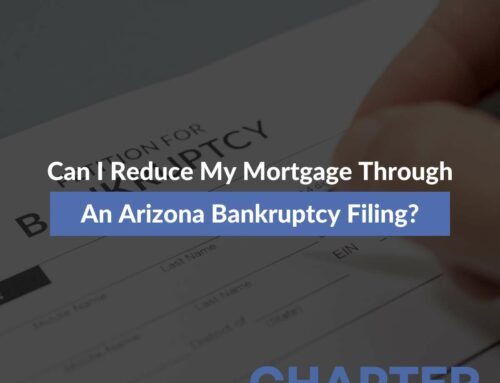Most people have experienced at least some point in life where debt seems like too much to bear. At the same time, taking on another considerable debt- a home mortgage- may be the only way to escape the expensive and sometimes predatory rental cycle. As the saying goes, it’s expensive to be poor. Bankruptcy can be a great way to get a handle on debt and stop creditors from taking actions that will make debt even harder to escape. But it comes with drawbacks, like a waiting period before qualifying for FHA home loans. Depending on your specific financial situation, it may be better to buy a home before filing for bankruptcy or to put off buying a home for a few years. The best way to know which choice will be most advantageous for you is to discuss your unique circumstances with an experienced bankruptcy attorney. Call 480-448-9800 to schedule your free consultation with a knowledgeable member of our Arizona bankruptcy team today.

Bankruptcy Credit Implications
A bankruptcy filing will be a major part of someone’s credit history for a long time. A debtor who files any chapter of bankruptcy will be disqualified from FHA loans, traditional loans, and some VA loans for 2 years. A Chapter 7 bankruptcy will remain on the debtor’s credit report for 10 years. A Chapter 13 bankruptcy will remain on the debtor’s credit report for 7 years.
A bankruptcy won’t necessarily affect a debtor’s credit score negatively. It can have a positive impact under the right circumstances. Someone who has several accounts that are past due will see those instantly cleared in bankruptcy, which can boost that person’s credit score. But if someone has kept up to date on their accounts before filing, bankruptcy could hurt their credit score.
Bankruptcy & FHA Loans
The Federal Housing Administration, or FHA, offers special home mortgages. FHA mortgages can make it much easier for many families to purchase a home. They allow applicants who meet certain requirements to put down a smaller percentage for a down payment on a home. Qualifying for an FHA loan could be crucial to the acquisition of a home. But if bankruptcy is on the horizon, it can throw a wrench into plans of buying a home using an FHA loan.
FHA loans are affected slightly differently by the chapter the debtor chooses to file. A Chapter 7 bankruptcy will disqualify the debtor from an FHA loan for 2 years from the date of filing. Chapter 7 bankruptcy is relatively simple and discharges debts in 4-6 months. However, Chapter 13 bankruptcy is more involved, requiring a payment plan that lasts either 3 or 5 years. Here, the debtor will be disqualified from FHA loans for 1 year from the date of their last payment in the payment plan.
Completing the applicable waiting period doesn’t guarantee approval. For example, if a debtor completes a Chapter 7 bankruptcy, finances a new vehicle, and has it repossessed, their chances of approval for an FHA loan after the waiting period will decrease. So will evictions, wage garnishments, creditor lawsuits, and the like. Keeping a clean and positive credit history is the best way to ensure approval after the mandatory post-bankruptcy waiting period. Additionally, there is a 12-month exception for emergency circumstances, such as a natural disaster or the death of a spouse.
Bankruptcy & VA Loans
Lawmakers have passed initiatives to make life easier for veterans during and after their service. VA loans are even more forgiving than FHA loans. Unlike FHA loans, VA home loans don’t require a down payment and don’t require a minimum credit score for approval. However, the waiting periods after bankruptcy work the same as FHA loans. A debtor who files for Chapter 7 bankruptcy will be disqualified from VA loans for 2 years. A debtor who files for Chapter 13 bankruptcy will be disqualified from VA loans for 1 year from the date of their last payment.
Bankruptcy & Conventional Home Loans
Just like FHA and VA loans, conventional home loans are affected by bankruptcy filing. Private banking institutions can set their requirements for conventional loans, rather than abide by standards set by the federal government. However, mortgage lenders tend to have even stricter post-bankruptcy requirements than the federal government. After a Chapter 7 bankruptcy, a debtor must generally wait 4 years before becoming eligible for a conventional home loan. Debtors who discharge the debt in a Chapter 13 bankruptcy must wait 2 years after the final payment before qualifying for most conventional home loans. Some lenders also increase the waiting period to five years if the debtor has filed for bankruptcy more than once. They will also disqualify applicants who have had a home foreclosure in the past 7 years.
How To Rebuild Credit After Bankruptcy
Taking steps to improve credit after a bankruptcy discharge is crucial to being approved for a home loan in the future. There is no one surefire way to increase a post-bankruptcy credit score, but a debtor can use more than one method to make the process faster. Waiting around probably won’t be an option if the debtor has goals of buying a home. A Chapter 7 bankruptcy will remain on the debtor’s credit report for 10 years, and a Chapter 13 bankruptcy will remain on the debtor’s credit report for 7 years. This could drag down the debtor’s credit score until they take proactive steps to remedy it.
Credit cards could be a driving force behind a bankruptcy filing. Ironically, they may also be a key part of rebuilding credit after bankruptcy. The main focus of post-bankruptcy credit rebuilding is to have available revolving lines of credit that are paid in a timely fashion. When paid off in full, credit cards can offer added benefits like airline miles and cash back. But when left to accrue interest, they can put the debtor right back where they started. They may also have costly fees for initiation, yearly membership, etc. A post-bankruptcy debtor should be sure to review all credit card offers carefully. There will most likely be several credit card offers available, but they won’t all necessarily be good ones.
An auto loan may be another major factor in a person’s credit score. Paying an auto loan off each month will help pad the debtor’s credit score under the right circumstances. A vehicle financed after bankruptcy needs to be credit reported to the major credit bureaus. That includes both positive reports- timely payments- and negative reports- missed and late payments. But if the debtor keeps a financed vehicle through bankruptcy, that lender will no longer be required to positive report. Negative reporting can continue.
Experienced Arizona Bankruptcy Lawyers Addressing Home Loan Needs & More
Are you an Arizona resident considering filing for bankruptcy, but are hesitant due to disqualification for future home mortgages? At Chapter Bankruptcy Lawyers, our Arizona bankruptcy lawyers can discuss your specific situation and help you decide if bankruptcy is a good route for you. Eligible clients can utilize our Zero Down filing system, which can also improve post-bankruptcy credit when payments are made on time. To learn more, contact us to schedule your free consultation or call us at 480-448-9800.
Chapter Bankruptcy Lawyers
Mesa Office
3707 E Southern Ave
Mesa, AZ 85206
Phone: 480-405-1010
Email: [email protected]
Tempe Office
4500 S Lakeshore Dr #300
Tempe, AZ 85282
Phone: 480-562-6145
Email: [email protected]







